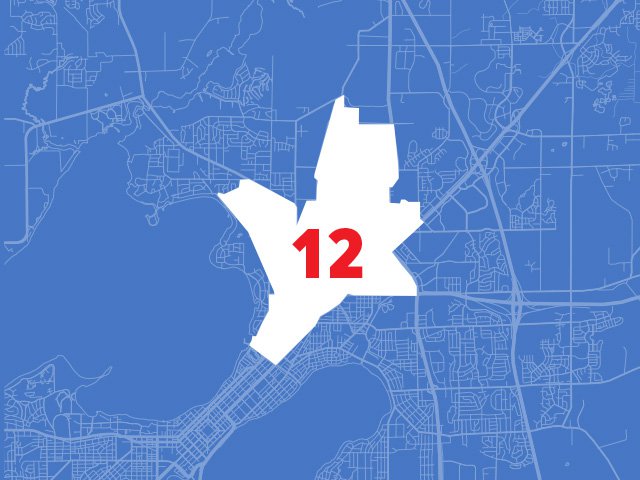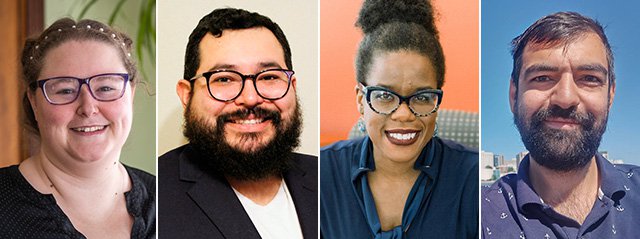Five candidates are vying for the seat on Madison’s north and east sides

In a city full of competitive council races, the race for District 12 on Madison’s north and east sides may be the most competitive of all. After Ald. Syed Abbas stepped down in December, the city council appointed former Ald. Barbara Vedder to fill the slot on an interim basis. With no incumbent, five primary candidates jumped into the fray, the most of any aldermanic race in Madison. None of the five have previously held elected office and none holds an obvious advantage. One of these newcomers to the council will represent a district containing some of the city’s most significant projects, including the Madison Public Market, the permanent men’s shelter, and the former Oscar Mayer site.
The candidates who will face off in the Feb. 21 primary are Julia Matthews, a research specialist for the UW Center for Tobacco Research and Intervention; Amani Latimer Burris, an advisor to social justice advocate Opal Lee; Blake Alvarenga, an IT consultant for Smart Solutions; Victor Toniolo, a biotech worker for Scientific Protein Laboratories; and Josh Walling, a carpenter and entrepreneur. The top two vote-getters will advance to the general election on April 4.
Jumping in
Several candidates say the lack of an incumbent or a clear favorite running in District 12 left the door open for those who have been politically active in Madison, but who would be new to elected office.
Matthews’ run began last fall when she went to an event put on by Emerge Wisconsin, a group that trains women to be candidates for political office. She says that talking to featured speaker Danica Roem, a Virginia legislator, and Madison Mayor Satya Rhodes-Conway, helped her see running for office as a realistic possibility.
At the event, her partner mentioned to Rhodes-Conway that Julia thought council meetings that run until 3 a.m. were the most interesting to follow. “I have a future alder here!” shouted Rhodes-Conway to Emerge’s executive director. Julia filed to run.
Burris was methodical about her entrance into the race, making a long list of the pros and cons of running. She is familiar with the political world, having worked in state Sen. Lena Taylor’s office and as a campaign aide to former Madison Mayor Paul Soglin. She serves as the current communications chair for the Dane County Democratic Party, and is also the only candidate who has previously run for office, losing a bid for state Senate in 2020 and Dane County Board in 2021.
“I gave it a lot of thought,” says Burris. “I found myself with four pages of pluses and minuses, and it came up plus 10.” She jumped in.
Alvarenga’s political engagement started in activism and protest. He participated in demonstrations throughout the Trump administration and more recently in favor of abortion rights after the U.S. Supreme Court overturned Roe v. Wade. Last year, he started teaching firearm safety classes as an extension of his activism and with the goal to reduce gun deaths.
Alvarenga underlined the point made by several candidates that Abbas’ retirement opened the door to a wide open field. “I didn’t see a strong candidate come forward, so I decided to run,” says Alvarenga. “I was sad to see Syed Abbas go. I think he did a really good job representing District 12.”
Toniolo is running perhaps the most stripped down campaign of the field. “I’m running my campaign solo. I don’t have a staff, I pressed my own buttons, I designed my own signs, and I’m not accepting campaign donations,” says Toniolo. “I don’t like people to think I’ve been bought by any interest.”
Josh Walling did not respond to requests for comment for this story.

From left to right: Julia Matthews, Blake Alvarenga, Amani Latimer Burris, and Victor Toniolo (Josh Walling not pictured).
A district feeling the squeeze
For most of the candidates, campaigning in the primary has involved filling out stacks of candidate questionnaires from local groups and spending long weekend hours in the cold knocking on hundreds of doors. All the candidates interviewed say that housing affordability tops the list of constituent concerns.
Median rent in District 12 has jumped about 40 percent since 2010 according to an Isthmus analysis of U.S. Census Bureau data and American Community Survey estimates. In 2010, median rent in most areas of the district hovered around $700 per month. That number rose sharply to about $1,000 per month by 2021, the most recent year for which data is available. The increase is about twice the rate of inflation over the same period.
Those hikes have squeezed renters in the district: half pay 30 percent of their income or more on rent, a benchmark for being considered “rent-burdened.”
Candidates say that it’s not just low-income residents or renters feeling the pressure either. “Obviously we always need affordable housing,” says Matthews. “But there’s also definitely people who are falling just outside of the affordable housing qualifications who don’t make enough to live in a luxury building but also don’t meet the requirements to live in affordable housing.”
Alvarenga says he also wants to make affordable homeownership a priority after talking to families who have rented in the city for generations without being able to buy a home. Matthews also notes that seniors on a fixed income may own their homes, but struggle to keep up with property taxes that rise along with home values and put pressure on them to sell.
Data backs up what they hear from residents. The cost of the median home in the district has risen from roughly $170,000 in 2010 to $200,000 today. About a quarter of homeowners in the district spend more than 30 percent of their income on the costs of homeownership.
The district had more homeowners than renters a decade ago, but has been trending steadily toward renter households, which now comprise the majority of the district, according to Census data.
The candidates have some ideas in common when it comes to addressing the housing challenge. They all say they want to expand Madison’s Affordable Housing Fund, which the council can use to finance affordable housing developments, and provide other incentives to developers to continue building more units.
“I don’t think we have an anti-development candidate in District 12,” says Alvarenga.
Constituents taking the lead
Whichever candidate ultimately wins, they will be a newcomer to the council, and all say they will place a priority on listening to constituents and making sure those views are reflected in policy decisions.
“My candidacy is primarily focused on being available to my constituents,” says Toniolo. He says he wants to focus on good communication with constituents to be able to connect them to help. “The problem sometimes is not providing services, it’s getting the word out that these programs exist.” He also says his activity on social media can help drive constituents with concerns toward more formal channels for input and feedback, even those outside his district.
Burris says she wants to listen and bring people together, something that she says Abbas did a good job of during his time on the council. “It wasn’t about his specific agenda but advocating for the diversity of voices in the neighborhood,” says Burris. “My agenda is the agenda of listening and learning and trying to translate that into action for my neighborhood.”
Knocking on doors and talking to district residents has already broadened some candidates’ thinking. Several say they were surprised to hear how many residents think the biggest public safety issue in the district is aggressive driving and excessive speed. “You get to the real issues that concern people knocking on doors,” says Alvarenga. “People are more concerned about traffic. ‘I don’t want to get run over crossing the street. Can we get a roundabout or sign?’”
[Editor’s note: The map of District 12 was adjusted with the latest boundaries.]